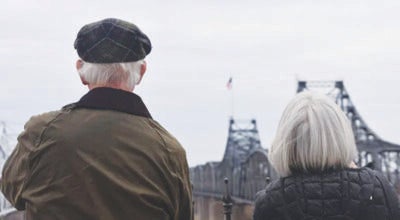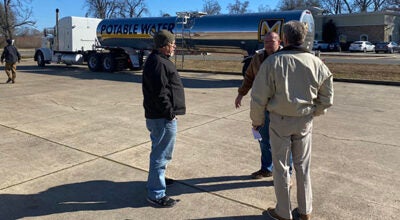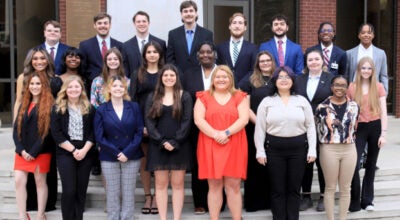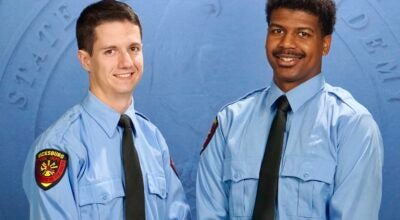Katrina brought terrible devastation, but also brought out the best in people
Published 12:42 am Saturday, August 29, 2015
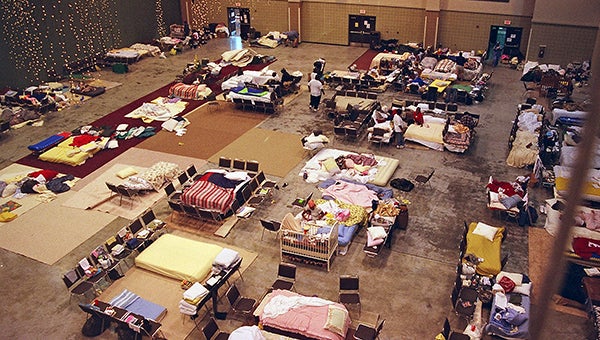
- CONVENTION SHELTER: The Vicksburg Convention Center went from hosting glamourous events to being an essential shelter for Hurricane Katrina evacuees in 2005. The center also provided evacuees access to computers and resources to find family members and to gather crucial information following Katrina’s devastating landfall along the Louisana and Mississippi Gulf Coasts.
‘The worst of times, but the best of times’
Ten years ago, Hurricane Katrina slammed into the Gulf Coast like none before it, leaving devastation and heartache in its wake.
The effects reverberated throughout the country and here in Vicksburg.
After the storm had hit, many Vicksburg churches opened their doors to refugees. After a few days of full churches and tired volunteers, the Vicksburg Convention Center opened its doors to 400 people on Sept. 1.
What they thought would last a week or two ended up being nearly a month of people living within the center’s exhibit hall.
Annette Kirklin, currently the convention center’s executive director, was the center’s special projects coordinator in 2005. The storm caused an upheaval in the daily lives of most here, she said.
“We had to cancel some events,” Kirklin said. “We had to rearrange some schedules and make it happen.”
The staff at the VCC, including Erin Southard, events and operations manager, set up around-the-clock schedules to make sure people were taken care of and safe. Kirklin was at the convention center-turned shelter for 24 hours on the first day it was open.
Their own homes were without power. Kirklin’s home was one of the first to get power after four days. Southard’s home had power restored two weeks later.
With the electricity being out, money was inaccessible through ATM machines and cards could not be swiped at businesses. Cash was the only form of currency with most places not taking checks.
Lines for gas stretched for miles once word got out that gas had been delivered to the area. Southard knew people from Brookhaven who drove to Vicksburg for gas. Gas stations sold out within hours.
“We were having to deal with issues at home and then coming here and taking care of people who had a lot worse issues than we did,” Kirklin said.
The people who lived in the VCC named their community the Crescent City and elected a mayor, enacted laws and set up streets.
“They didn’t want to be referred to as refugees or evacuees. They wanted to be known as the residents of Crescent City,” Kirklin said.
The residents hosted game and movie nights. Buses picked the children up for school and local businesses offered some people jobs. The city had a dining hall, playroom, chapel and counseling and donation rooms. Tents were set up outside to house the residents’ pets.
“It truly formed a feeling of family,” Southard said.
The family was diverse.
“You had all walks of life. You had people that were blue collar, white collar, families, singles,” Southard said.
The casinos worked together to provide them with meals, and the Red Cross served the people. Churches, companies, businesses and more all gave what they had.
“That’s not something everybody will ever experience, their building becoming a shelter of that magnitude. It was just nice meeting the different people and the camaraderie that developed between the volunteers that were coming from everywhere,” Southard said.
A medical center was set up in the meeting rooms upstairs. Rick Stone, who works at Merit Health River Region, helped coordinate a triage at the VCC. He said the medical volunteers did home health type services like dressing changes, physicals and screened people who had been exposed to the high waters for extended periods of time.
“I was greatly, deeply impressed with the people of Vicksburg,” Stone said.
Tragedy spawns love story
The people of Vicksburg, including Red Cross volunteer Jessica Lord, and many outsiders came together to donate their time and energy as well as beds and other items the displaced people needed. Eventually, members of the Indiana National Guard, including Tommy Solomon, came to help with the medical needs and security.
Solomon was told to introduce himself to the volunteers and began spending time with Lord. After Solomon and the National Guard moved their operation down toward the coast, the couple continued to keep in touch and began officially dating long distance.
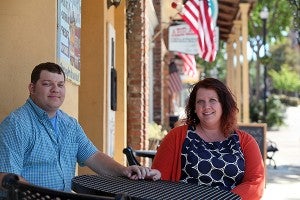
KATRINA CONNECTION: Tommy and Jessica Solomon met in 2005 during Hurricane Katrina relief efforts and were married within the next year. Jessica, a Vicksburg resident, was a college student and volunteered at shelters like the Vicksburg Convention Center, where Tommy’s Indiana National Guard unit was stationed.
They visited back and forth with each other between Mississippi and Indiana for months before getting engaged and marrying where they met, Crossway Church, a year later in September 2006. They were 20 when they met, 21 when they married and 10 years later at 30, they are still together.
“We had plenty of people, friends and family included, who just knew it wasn’t going to work. We either were too young, hadn’t known each other long enough or both. But here we are proving them wrong still,” Jessica said.
The tragedy was a wake-up call for the community.
“Vicksburg was never expecting this, and I think it actually put out a road map for how to prepare for something like this in the future,” Kirklin said.
Of the thousands of people who came to Vicksburg after the storm, it is speculated around 20 families stayed and made Vicksburg their permanent home. A total of 4,600 people came through the doors of the VCC throughout the month, and it was quite an experience that they won’t soon forget.
“It was the worst of times, but the best of times, because the circumstances were horrible, but the way that everybody came in here and with structure that we provided with the Red Cross, they all embraced it,” Southard said.


